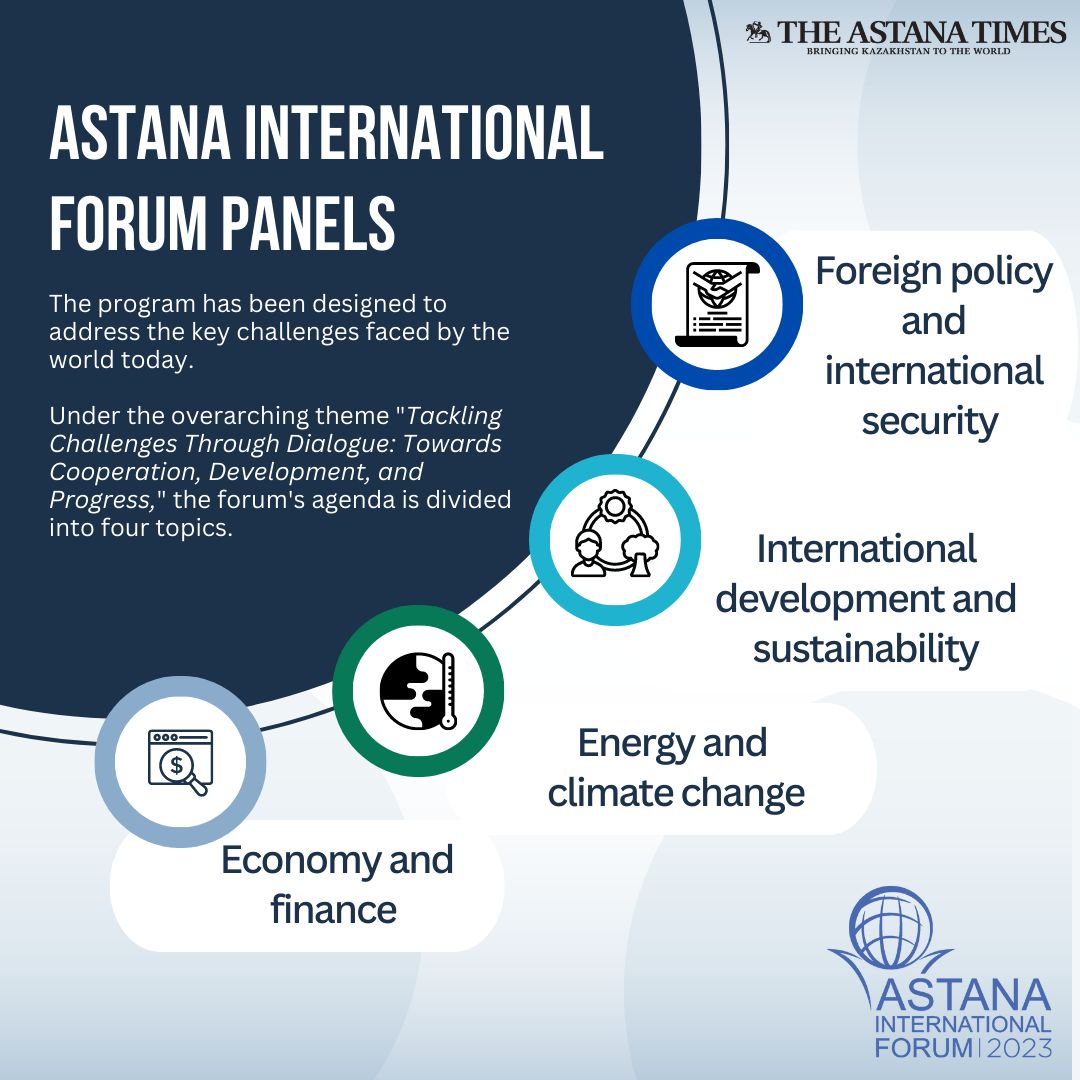The Kazakh capital is hosting the highly anticipated Astana International Forum (AIF) under the aegis of President Kassym-Jomart Tokayev on June 8-9. The forum’s mission is to promote global cooperation and peace by discussing issues that are currently high on the international agenda, including climate change and advancing security and development.

The event will attract more than 1,000 participants, including government leaders, international organizations, CEOs of multinational organizations and international experts.
President Tokayev previously noted that the Astana International Forum was created “to respond to global challenges, prioritizing cooperation as the fundamental principle of the functioning international system. Kazakhstan has a long history of developing constructive international relations, serving as a bridge between East and West.”
The program of the AIF includes keynote speeches, panel sessions, armchair discussions and side events. With its rich history and commitment to sustainable development, Kazakhstan stands as a shining example of progress in the Central Asian region. President Tokayev, known for his dedication to global cooperation and environmental protection, has set the stage for an impactful forum to generate solutions to pressing issues.
Matters related to foreign policy and international security are among the global challenges. The platform offers an opportunity to discuss diplomatic strategies, multilateral cooperation and regional stability.
The forum will host panel discussions on Rethinking Peace, Conflict, and the Global Order, The Future of Multilateralism, and Opportunities or Challenges: the UN’s Role in Ensuring Peace and Security. As the world faces emerging threats, the event will likely emphasize the significance of collective efforts, stressing the need for diplomacy, dialogue, and global partnerships to achieve lasting peace and stability.
On international development and sustainability, a side event From E-Commerce to Paperless Borders: How Digitization is Revolutionizing Trade will assess the digital transformation of global business. Issues like customer loyalty, cyber security, change resistance, digital skill gap and shortage of technical resources will be in the spotlight to bring forth viable solutions. The AIF will also cover dialogue on artificial intelligence, blockchain, renewable energy, and smart cities. By fostering collaboration between tech pioneers and policymakers, the forum can play a crucial role in harnessing the power of technology for humanity’s benefit.
Following the COVID-19 pandemic and its consequences, a panel on Assessing Progress on Global Health Preparedness has been included in the program.
Global energy and climate change are also highlighted in the agenda. The panel discussions will consider renewable and carbon market development, green energy transition, and economic transformation.
As a country that shares global climate change concerns, development of renewable energy is central to Kazakhstan’s plan to address rising carbon emissions. The country is planning to plant 2 billion trees by 2025, raise the national carbon absorption capacity, and reduce greenhouse gas emissions by 15% by 2030.
Kazakhstan is also promoting the Trans-Caspian International Transport Route, also known as the Middle Corridor. It is a vital trade artery that starts from Southeast Asia and China, runs through Kazakhstan, the Caspian Sea, Azerbaijan, Georgia and further to European countries. The Middle Corridor links China and the EU via rail, shipping and freight networks. Cargo shipments along the route have reached a record 3.2 million tons in 2022. The panel discussions at the AIF will highlight the significance of the Middle Corridor while focusing on the Central Asian connectivity, integration and trade.
As the host of the AIF, Astana is gaining significant exposure on the global stage. The forum will showcase the capital’s modern infrastructure, architectural marvels, and commitment to sustainable urban development.
The participants will have the opportunity to witness firsthand the country’s achievements in renewable energy, urban planning, and sustainable practices. In addition, networking and collaborations facilitated by the forum can contribute to building trust and understanding among nations, and ultimately promote global harmony.
In conclusion, the Astana International Forum holds immense promise as a platform for global cooperation and partnership in devising innovative solutions to modern challenges. As President Tokayev said: “We hope to build new bridges and strengthen ties, coming together to overcome collective challenges and charting a new path – diplomatic, economic, and political. I look forward to the opportunity to invite world leaders from the public and private sectors to the Astana International Forum, to find effective solutions to existing global challenges.”
The author is Muhammad Rafiq (Pakistan), a senior banker based in Kazakhstan with an interest in Central Asian studies.

